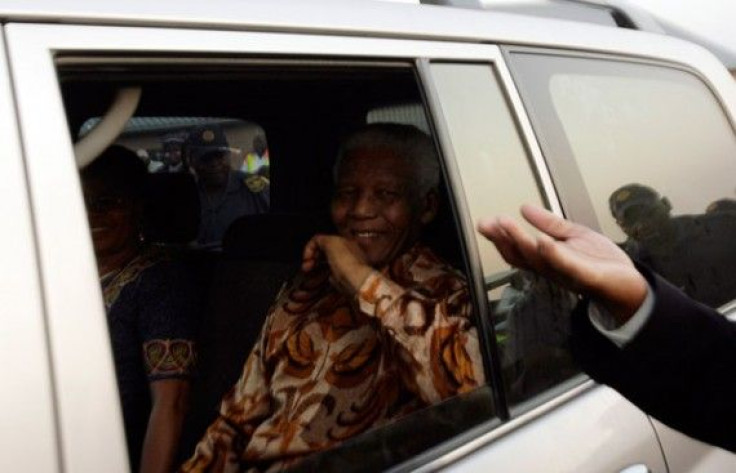Family Of Nelson Mandela To Debut On American Reality Television

South Africa’s anti-apartheid legend Nelson Mandela has avoided the public spotlight for years -- but now two of his granddaughters, Swati Dlamini and Zaziwe Dlamini-Manaway, are putting the minutia of their day-to-day lives on American television for millions to see.
The two women, both professionals in their 30s, will star in a new 13-episode reality series called “Being Mandela,” which will kick off on Sunday on COZI TV. Cameras will follow them as they go about their daily lives in Johannesburg, South Africa. Their famous grandfather is not expected to make an appearance.
Mandela is revered around the world as the father of modern South Africa. His lifelong efforts hastened the end of apartheid, the country's system of institutionalized racial segregation. After years of underground activism on behalf of the African National Congress, or ANC, a majority-black political party that was outlawed under South Africa's minority white rule, Mandela was imprisoned for 27 years, most of which he served on Robben Island just off the coast of Cape Town. He was released in 1990.
In 1994, Mandela became the first black president of South Africa. During his five-year term, he made it his mission to promote equality and progress for all South Africans, emphasizing his belief that white and black citizens had to work together to heal old wounds.
After stepping down from his presidential post, Mandela spent a few years working on important causes before retiring from the spotlight in 2004. But he agreed to make an appearance one last time in 2010 to mark the FIFA World Cup, a global soccer tournament that took place in South Africa that year.
While Mandela was at Robben Island, one of his granddaughters was snuck into the facilities when she was an infant in order to meet her grandfather. On the new television show, viewers will see that granddaughter, Dlamini-Manaway, making an emotional trip to that same prison.
The show is intended for American audiences. COZI TV is run by NBC Universal, the majority shares of which are owned by Comcast (NASDAQ:CMCSA). In addition to new shows, the channel airs classic TV series including Lassie, Charlie’s Angels and Magnum, P.I.
The star sisters’ parents are Prince Thumbumuzi Dlamini of Swaziland and Zenani Mandela, daughter of Winnie Mandela, who was married to Nelson Mandela from 1958 to 1996, though the two separated in 1992.
Winnie Mandela, who will feature prominently in the new reality show, is a controversial figure. She was involved in the ANC’s struggles at a time when internal divisions often erupted into violence, and she has been accused of various human rights violations. She was even convicted of kidnapping a 14-year-old boy who was suspected of acting as an informant for Mandela’s ANC rivals; the boy was later stabbed to death. Following appeal, Winnie Mandela’s original jail sentence was reduced to a fine.
It is no surprise that Nelson Mandela, who has shied away from media appearances for years, has offered no comment regarding the new show. The frail 94-year-old recently recovered from a lung infection, which had news outlets around the world buzzing about the state of his health.
But his granddaughters insist that he is happy and healthy, adding that Mandela enjoys reality TV and will probably watch their new reality show.
“You'll be interested to know that he loves Toddlers and Tiaras," said Swati to the Associated Press, referring to a reality show on the American channel TLC that follows young pageant contestants and their families.
"Because of the kids!” added Swati. “He just loves children.”
But Mandela’s oldest grandchild, Ndileka Mandela, cast doubts on that statement in an interview with The Guardian.
"I know he watches National Geographic and news channels but I don't know if he watches Toddlers and Tiaras," she said. "I've never seen him watch the program."
Not surprisingly, “Being Mandela” has garnered plenty of criticism from those who argue that it will tarnish the legacy of one of the world’s most iconic figures. But Dlamini argues that she’s well aware of those concerns.
"We get asked this question a lot. Is this not going to tarnish the name and is this not going to be bad for the name?" said Dlamini, according to the Associated Press.
"But our grandparents have always said to us, this is our name too, and we can do what we think is best fitting with the name, as long as we treat it with respect and integrity."
© Copyright IBTimes 2024. All rights reserved.












